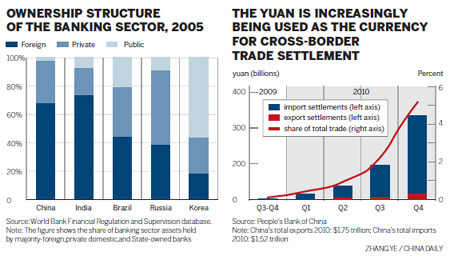'It's time for revamp of financial system'
Updated: 2012-02-28 09:34
By Wang Xiaotian (China Daily)
|
|||||||||||
World Bank report urges liberalized interest rates and fiscal transparency
BEIJING - The World Bank on Monday urged China to revamp its financial system in a decisive, comprehensive and coordinated manner to counter risks facing the nation over the next 20 years.
Reforms should follow a properly sequenced roadmap, and priority should be given to liberalizing interest rates according to market principles, the bank said in a joint report with the Development Research Center of the State Council, or China's cabinet.
"Central to the report's findings is the need for China to modernize its domestic financial base and move to a public financial system - at all levels of government - that's transparent and accountable, overseen by fewer but stronger institutions, to help fund a changing economic, environmental and social agenda," said Robert Zoellick, president of the World Bank.
"The reform agenda, with a stronger and more flexible financial sector, the promotion of innovation and green growth as drivers of development, can lead to opportunities for creating new jobs and additional productivity within China as well as new opportunities for foreign firms."
Reforms should include commercializing the banking system, gradually removing interest rate controls, deepening the capital market and further developing strong, independent regulatory bodies to support the integration of China's financial sector with the global financial system, the report said.
Guo Tianyong, director of the Banking Research Center at the Central University of Finance and Economics, said the demand for more liberalized interest rates and a market-based financial system was urgent.
"The current rules have generated great risks, as they led to abnormal phenomena such as excessively high profits in the banking sector, an outflow of deposits from lenders and a surge in private financing across the country," Guo said.
He said that as long as some preparatory work, such as establishing a deposit insurance system, is carried out, interest rate reform can start at any time.
Media reports said earlier this month that the People's Bank of China, the central bank, had finished drafting deposit insurance rules and would announce the establishment of the system before phasing in detailed policies.
Lu Zhengwei, the chief economist at the Industrial Bank Co Ltd, said Chinese lenders haven't yet prepared for liberalized interest rates, which are expected to widen performance gaps among banks and push some weak players to the edge of failure.
"It may not be a good time for China to loosen the reins, because at present the overall demand for capital is still extremely high while growth in deposits lags the GDP growth rate, which means once interest rates are liberalized, the risks lenders face will be huge," said Sun Maohui, a professor of finance at Shanghai Normal University.
Having a market-based financial system is a necessity for China if it wants to float the yuan globally, because free flows of foreign capital must be based on the precondition of a free and fair financial market for both domestic and foreign players, said Chen Daofu, policy research chief of the Financial Research Institute at the Development Research Center.
Acceptance of the yuan as a major global reserve currency will depend on the pace and success of financial sector reforms and the opening of China's external capital accounts, said the World Bank.
China's growing weight in world trade, the size of its economy and its role as the world's largest creditor have made the internationalization of the yuan "inevitable", it said.
The report makes the case for the government to redefine its role - to focus more on systems, rules and laws - to boost efficient production, promote competition and reduce risks.
The bank also recommends redefining the roles of State-owned enterprises and breaking up monopolies in certain industries, diversifying ownership, lowering entry barriers to private firms, and easing access to finance for small and medium-sized enterprises.









